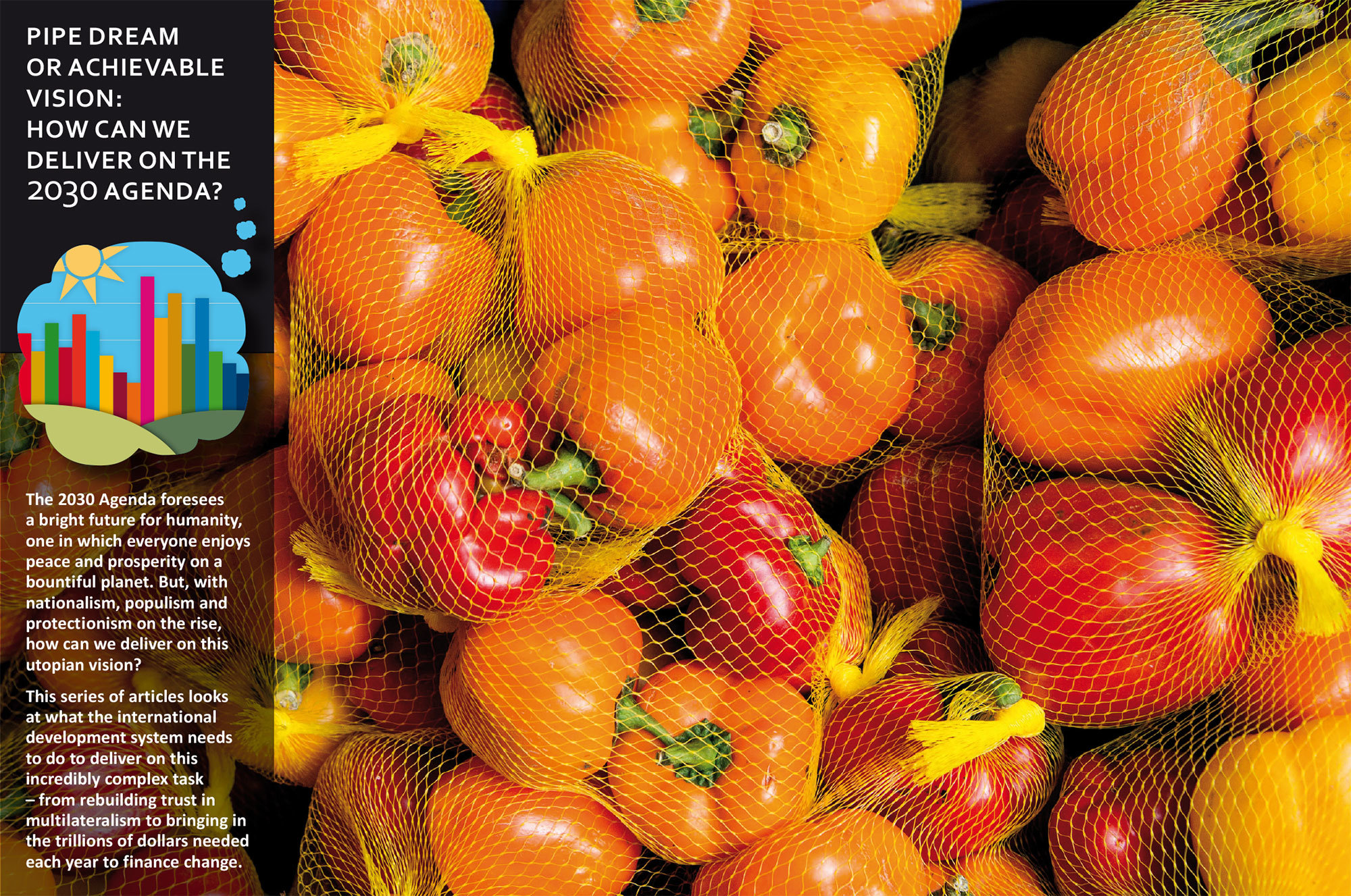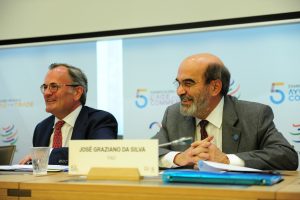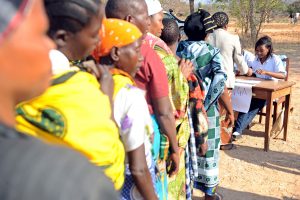This article is the third of a series: Pipe dream or achievable vision: How can we deliver on the 2030 Agenda?
The 2030 Agenda foresees a bright future for humanity, one in which everyone enjoys peace and prosperity on a bountiful planet. But, with nationalism, populism and protectionism on the rise, how can we deliver on this utopian vision? This series of articles looks at what the international development system needs to do to deliver on this incredibly complex task – from rebuilding trust in multilateralism to bringing in the trillions of dollars needed each year to finance change.
The first article can be found here: “Trust or bust: The UN must put its house in order to attract finance for development”. The second article – “How 2030 Agenda Provides Chance for Countries to Escape “Middle-Income” Trap and Help Finance Global Development”.
The 2030 Agenda for Sustainable Development calls for a wide-ranging financing framework capable of channelling resources that respond to investment needs for the Sustainable Development Goals (SDGs) in developing countries: estimated to be around USD 3.3 to 4.5 trillion per year.
Trade can play a major role in supporting the financing effort through initiatives such as Aid for Trade (A4T), an initiative that interlocks aid and trade policies in order to “help low-income countries overcome the barriers that constrain their ability to benefit from trade expansion, as well as to promote a stronger impact of trade on economic growth and poverty reduction”.
IN THE PHOTO: 30 June 2015, Geneva, Switzerland – FAO Director-General José Graziano da Silva on a panel during the Fifth Global Review of Aid for Trade. CREDIT: WTO/Studio Casagrande
However, we must guarantee that trade, and in particular agricultural trade, is inclusive, and that development assistance links with trade are coherent with the 2030 Agenda.
Global trade system
Trade has been a controversial topic for several decades. In recent years, we have seen the ideological divide on trade widen. It has been branded as a geopolitical economic ‘weapon’ of powerful states, we have witnessed the evolution of multilateral agreements that govern it and heard economists debating over its relative global slowdown.
Looking at performance alone, production and trade globalisation thrived from 1990 onwards with the removal of barriers and technological advances that led to cost reductions. The decline in costs of production and transportation helped create highly integrated global production networks or global value chains (GVCs).
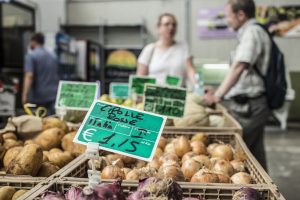
IN THE PHOTO: 14 June 2016, Fiumicino, Italy – Participants of Global Alliance for Climate-Smart Agriculture (GACSA) Annual Forum, held at FAO Headquarters attend a field visit to Orto Sole cooperative farm in Fiumicino and Torrimpietra. CREDIT: FAO/Alessandra Benedetti
Yet recently things have been different. World trade volumes have lagged behind GDP growth and, according to the latest OECD-FAO Agricultural Outlook, the agricultural trade will increase at a slower rate. Moreover, technological developments in manufacturing are having and will likely continue to have a strong impact on the GVCs that were at the core of the rise of the North-South trade from 1990 onward. It is not surprising that questions have been raised over the pace and direction of trade. Who is benefiting? Are the gains reaching the middle and bottom of the economic and social pyramid? Does it have the potential to boost development?
The WTO Doha Development Agenda (DDA) was launched in 2001 with a goal of establishing new trade rules, notably in the areas of agriculture (i.e. export competition, market access and domestic support pillars). However, power within the WTO has arguably shifted from Northern dominance to a stalemate between North and South – with the only agreement coming on a small part of this agenda at the 9th Ministerial Conference in Bali in December 2013, the most substantive outcome being the Trade Facilitation Agreement (TFA).
Given the lack of progress in multilateral negotiations, many countries have been pursuing Regional Trade Agreements (RTAs). Some RTAs go beyond commitments made in the WTO and remain open to additional participation by countries prepared to meet their standards. The ‘mega-regional’ initiatives under negotiation represent an entirely new scale, aiming to go beyond providing preferential access to member countries’ markets and addressing “behind the border” measures. While agriculture and food security are an integral part of these agreements, their treatment in RTAs has been divisive.
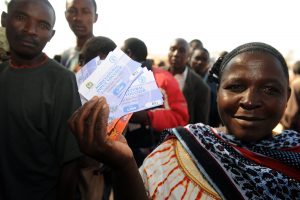
IN THE PHOTO: 05 September 2012, Chamwino, Tanzania – Input trade fair hosted by the Chamwino District Council and facilitated by FAO. For the first time, 400 farmers from 5 villages were granted trade vouchers by FAO that enabled them to purchase the quality declared seeds and farm equipment from the agro-dealers at the trade fair. CREDIT: FAO/Simon Maina
Trade and food security
In this overall context, it is important to understand the potential role of trade in achieving the SDGs, in particular for agriculture and food security. In theory, international trade can contribute to food availability by increasing the amount and variety of food on the market. Food availability can also be enhanced by regional integration markets, facilitating trade flows from surplus to deficit areas.
International trade can play an important role in reducing price risk by enabling countries to make use of world markets in the face of domestic production volatility. Well-functioning regional markets can reduce the price of food, its volatility and the uncertainty of supply. However, the trade/food security nexus is complex, a specific policy can affect countries, and groups within countries, in different ways.
The SDGs recognise that international trade contributes to sustainable development. The challenge is how to ensure that the expansion of agricultural trade works in favour of the elimination of hunger, food insecurity and malnutrition. To ensure that agricultural trade contributes to the achievement of the SDGs, it is important to guarantee that trade policies and strategies are coherent with other national policies. Trade and related local policies must prioritise long-term structural transformation objectives over short-term interests. The 2030 Agenda recognises that transparent, non-distorted and well-functioning global agricultural markets are an essential element in the global effort to end hunger, achieve food security and improved nutrition, and promote sustainable agriculture (SDG 2).
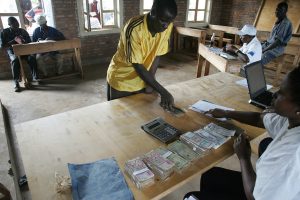
IN THE PHOTO: Registration for an Input Trade Fair, one of the FAO’s preferred methods to stimulate local food production. CREDIT: FAO/Giulio Napolitano
Aid for trade
Trade also has a special role in aid, donor-recipient relationship and the process of financing development. SDG 8.a calls for increasing “Aid for Trade” support for developing countries, in particular, least developed countries (LDCs).
“Agriculture is the backbone of the economies of LDCs … [and] can play a pivotal role for economic growth and poverty reduction,” said FAO Director-General José Graziano da Silva, – “Trade can influence market structure, value-chain development, investment in agriculture, rural employment and income. For those reasons, trade is a key enabler of the SDGs.”
According to the International Centre for Trade and Sustainable Development research in July 2017, A4T commitments stand at USD 54 billion a year, with cumulative disbursements reaching almost USD 300 billion. More than three-quarters of the total backed projects are in four sectors: transport and storage (28.6 percent), energy generation and supply (21.6 percent), agriculture (18.3 percent), and banking and financial services (11.1 percent).
Indeed, A4T plays an important role in achieving the SDGs, but trade by itself does not guarantee poverty and hunger reduction. We need to clearly establish the links between fairer and sustainable trade and the achievement of the SDGs in a complex Official Development Assistance (ODA) landscape, which increasingly focuses on humanitarian crises and the competition for resources is difficult.
We should not forget that the 2030 Agenda is a collective effort that is reshaping the way we pursue development. We must address asymmetric relationships where ‘donors’ impose their agenda on developing nations.
A4T must look beyond traditional ODA and tap into South-South cooperation and public-private partnerships.
What we can do
For FAO, partnering with regional actors has been fruitful. For instance, FAO and ALADI, a Latin American association promoting regional economic integration, are collaborating on a programme that aims to bolster the export potential of family farmers and small- and medium-sized agricultural enterprises. Latin America and the Caribbean is an important food producing region, with space to increase productivity and self-supply, and a growing role as a supplier of basic products and food. The programme offers training, technical assistance and support through tailored individual consultations so that participants can develop commercial skills and appropriate strategies for products such as coffee, quinoa and honey.
The agri-food sector must be understood as a key pillar for development and the fight against hunger and poverty in the region, while regional integration is an important instrument for the consolidation of food security and the position of the region in global agri-food systems. This means developing a strategy that integrates national actions related to food security and the fight against hunger with trade negotiations and regional integration, allowing the incorporation of small agri-food productions and facilitating access of the most vulnerable to food.
Within the complex trade realm and amidst an evolving and challenging aid architecture, FAO supports developing countries in implementing current trade agreements and in preparing for trade negotiations through studies, analysis, training and experience sharing.
IN THE PHOTO: 05 September 2012, Chamwino, Tanzania – Input trade fair hosted by the Chamwino District Council and facilitated by FAO. For the first time, 400 farmers from 5 villages were granted trade vouchers by FAO that enabled them to purchase the quality declared seeds and farm equipment from the agro-dealers at the trade fair. CREDIT: FAO/Simon Maina
The trade-SDG achievement link comes from identifying direct support to small producers who are not included in agri-chains. With support, smallholders increase their chances of joining regional and global value chains and of getting fairer prices for their work and commodities. Moreover, agri-business models focused on multinationals linked to megaregional trade deals might pose a threat to smallholder farmers and the achievement of the SDGs. FAO and others can play a key role in helping shape the trade debate into one where deals support smallholder farming.
We can also play a role in turning A4T into an additional vehicle for achieving the SDGs. A4T demands a multilateral trading system that follows the 2030 Agenda. Smaller nations and farmers need trading rules where asymmetries, differential treatment, trade promotion and facilitation policies are in check and follow a level playing field. A multilateral trading system that guarantees transparent, non-distorted and well-functioning global agricultural markets is a better path than mega trade agreements pushed by a few developed nations.
For A4T to be a real tool for SDGs achievement, trade-related policies in support of developing nations should focus on producers and their livelihoods. Transforming the small producer into a productive actor in the economy will have a direct positive impact on the SDGs.
The next article in the series, to be published on 27/02/2018 will look at BRICS and its significance in the context of the 2030 Agenda.
FEATURED PHOTO CREDIT: FAO/Giuseppe Bizzarri Editors note: The opinions expressed here by Impakter.com columnists are their own, not those of Impakter.com


